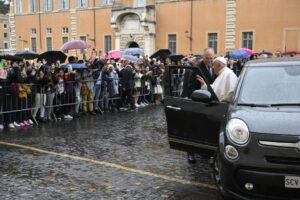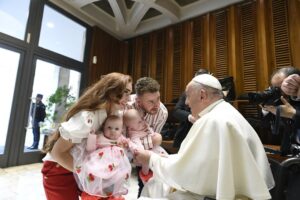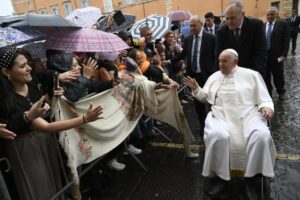This morning’s General Audience took place at 9.00 in the Paul VI Hall, where the Holy Father Francis met the groups of pilgrims and faithful from Italy and all over the world.
In the speech in Italian, the Pope, continuing the cycle of catechesis on “The vices and virtues”, focused his reflection on the theme of faith (Reading: John 9.35-38).
After summarizing his catechesis in the different languages, the Holy Father addressed particular greetings to the faithful present.
The General Audience concluded with the recitation of the Pater Noster and the Apostolic Blessing.
The following text includes parts that were not read out loud, but should be considered as such.
Cycle of Catechesis. Vices and Virtues. 17. Faith
Dear brothers and sisters, good morning!
Today I would like to talk about the virtue of faith. Together with charity and hope, this virtue is described as theologal. There are three theologal virtues: faith, hope and charity. Why are they theologal? Because they can be lived – this virtue, the three theologal virtues – only thanks to the gift of God. The three theologal virtues are the great gifts that God gives to our moral capacity. Without them, we could be prudent, just, strong and temperate, but we would not have eyes that see even in the dark, we would not have a heart that loves even when it is not loved, we would not have a hope that dares against all hope.

Moses was be a man of faith when, welcoming God’s voice even more than one doubt could have shaken him, he continued to stand firm and trust in the Lord, and even defend the people who were so often lacking in faith.
The Virgin Mary was a woman of faith when, receiving the annunciation of the Angel, which many would have dismissed as too demanding and risky, answered, “Behold, I am the handmaid of the Lord. May it be done to me according to your word” (Lk 1:38). And, with her heart full of faith, with her heart full of trust in God, Mary set out on a path of which she knew neither the route nor the dangers.

With regard to faith, an episode of the Gospel comes to mind. Jesus’ disciples were crossing the lake, and are surprised by the storm. They think they can get by with the strength of their arms, with the resources of their experience, but the boat starts to fill up with water and they are seized by panic (cf. Mk 4: 35-41). They do not realize that they have the solution before their very eyes: Jesus is there with them on the boat, in the midst of the storm, and Jesus “was asleep”, says the Gospel. When they finally awaken Him, fearful and even angry that He would let them die, Jesus rebukes them: “Why are you afraid? Have you no faith?” (Mk 4:40).
Here, then, is the great enemy of faith: it is not intelligence, nor is it reason, as, alas, some continue obsessively to repeat; but the great enemy of fear. For this reason, faith is the first gift to welcome in Christian life: a gift that must be welcomed and asked for daily, so that it may be renewed in us. It is seemingly a small gift, yet it is the essential one. When we were brought to the baptismal font, our parents, after announcing the name they had chosen for us, were asked by the priest – this happened in our baptism: “What do you ask of the Church of God?” And the parents answered: “Faith, baptism!”
For Christian parents, aware of the grace that has been given them, that is the gift to ask for their child too: faith. With it, parents know that, even in the midst of the trials of life, their child will not drown in fear. See, the enemy is fear. They also know that, when the child ceases to have a parent on this earth, he will continue to have a God the Father in heaven, who will never abandon him. Our love is so fragile, and only God’s love conquers death.

_____________________________
Special Greetings
I extend a warm welcome to the English-speaking pilgrims and visitors taking part in today’s Audience, especially the groups from Finland, Malta, the Netherlands, Norway, Uganda, India, Malaysia, Canada and the United States of America. I also wish to express to the people of Kenya my spiritual closeness at this time as severe flooding has tragically taken the lives of many of our brothers and sisters, injured others and caused widespread destruction. I invite you to pray for all those affected by this natural disaster. Even amidst adversity, we remember the joy of the risen Christ, and I invoke upon you and your families the loving mercy of God our Father. May the Lord bless you!
______________________
Summary of the Holy Father’s words
Dear brothers and sisters: In our continuing catechesis on the theological virtues, which unite us to God and strengthen the moral virtues, we now turn to faith. The Catechism states that by faith we believe in God and all that God has revealed to us, and freely commit our entire self to him (cf. No. 1814). Throughout the Scriptures, we encounter poignant examples of this manifested in the lives of such individuals as Abraham, Moses and the Blessed Virgin Mary, who embarked on uncharted paths fraught with perils entrusting themselves completely to God. Yet even among believers, there are times when faith can falter and fear takes hold. Let us remember that faith is a gift, a gift that must be asked for with confidence in the power of God’s grace to give stability and strength to our lives. Like the disciples in the boat, buffeted by the storm on the lake, let us turn to Jesus each day and beg him: “Lord, increase our faith!” (Lk 17:5)










